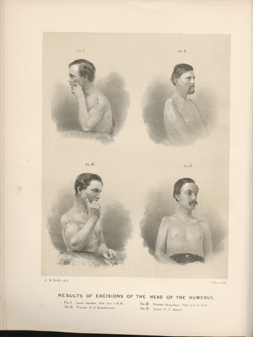Title: Rand, C. F.
Source text: The Medical and Surgical History of the War of the Rebellion. (1861-65.), Part 2, Volume 2 (Washington, DC: Government Printing Office, 1876), 529.
Civil War Washington ID: med.d2e31381
TEI/XML: med.d2e31381.xml
CASE 1500.—Sergeant C. F. Rand, Co. K, 12th New York, aged 24 years, was wounded at Gaines's Mill, June 27, 1862. There is no hospital record of the case until the patient's arrival at Philadelphia; but, twelve years subsequently, the injured man stated that: "He laid on the field all that night, and was carried to the general field hospital at Savage's Station the next morning. There was free bleeding from the wound. At Savage's Station the head of the humerus was excised either by Surgeon E. Bentley, 12th New York, or by Acting Assistant Surgeon J. Swinburne. From this station, he was sent to Richmond." He complained of the road and river transportation. After discharge from the prison hospital he stated that he was exposed at the dock until the arrival of the transport Daniel Webster, on which he was conveyed to Philadelphia. He entered Satterlee Hospital on July 30, 1862, and was discharged a month subsequently and pensioned, Surgeon I. I. Hayes certifying: "Resection of shoulder, necessitated by shot wound." This pensioner re-enlisted in the Veteran Reserves, and was appointed in November, 1863, a second lieutenant, and assigned, in May, 1864, to duty at Douglas Hospital. Assistant Surgeon W. Thomson, U. S. A., had prepared a photograph, which is copied in Figure 4 of PLATE XIV, opposite page 529, and furnished a copy to the Museum with the following memorandum: "This officer can use his arm at table, and plays well on the banjo." On January 1, 1868, Lieutenant Rand was discharged. Examiner John Root, of Batavia, New York, in June, 1869, reported: "The arm hangs by the muscles and ligaments, and for manual labor is of no use;" and, in September, 1873, Examiner J. O. Stanton reported: "About three inches of shortening of the limb. Cannot raise the arm. Has little use of the hand." This pensioner was paid in September, 1874. He availed of the opportunities afforded by his assignment to hospital duty to study medicine, and, receiving a diploma from one of the medical colleges in Washington, became a practitioner there. In addition, he occupies a responsible position in the Post Office Department. The result of the primary excision in this case is very satisfactory.
